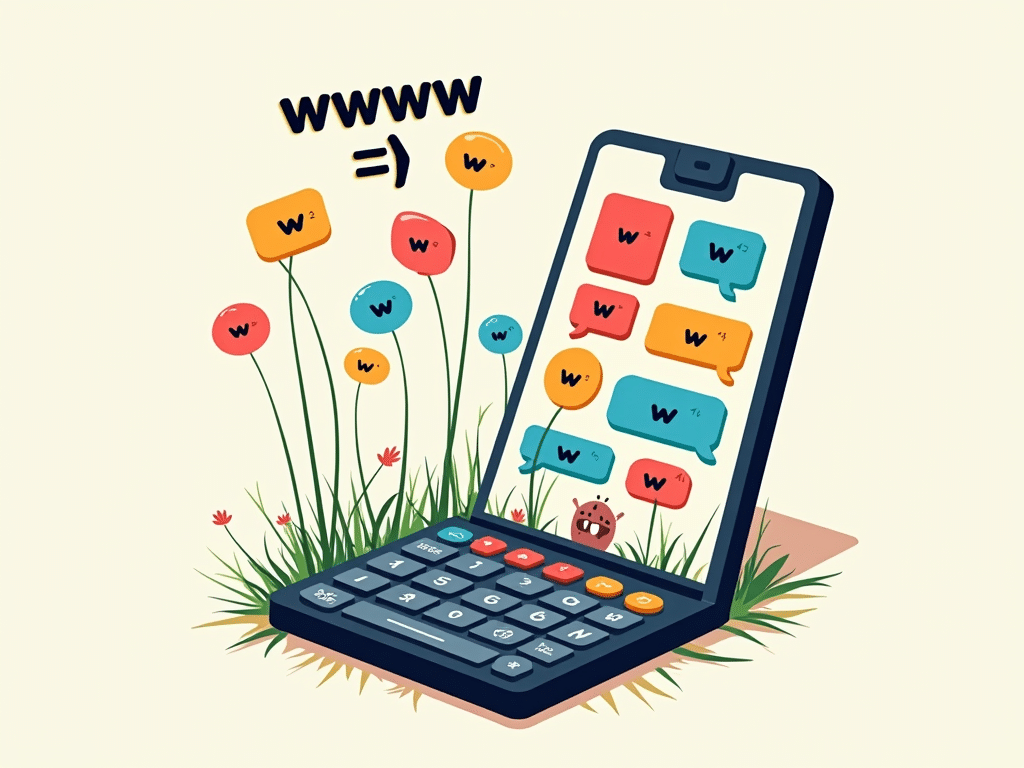Have you ever stumbled upon a Japanese comment section and seen a string of “w”s? If you’re not familiar with Japanese internet culture, you might have been puzzled. Don’t worry! This article will explain everything you need to know about “wwww”, the Japanese equivalent of “hahaha” or “kkkk“.
| Key Takeaways |
|---|
| “wwww” is Japanese for “hahaha” |
| It comes from “warai” (笑い), meaning “laugh” in Japanese |
| It’s used in online chats, social media, and gaming communities |
| The number of “w”s can vary to show different levels of amusement |
| It’s unique to Japanese internet culture |

The ABCs of “wwww”
“wwww” is how Japanese internet users express laughter in text. It’s the go-to expression for showing amusement in online conversations, social media posts, and especially in gaming communities. But why “wwww” instead of “hahaha”? It all comes down to language.
In Japanese, the word for “laugh” is “warai” (笑い). The first letter of this word, “w”, became shorthand for laughter in online spaces. So when you see a string of “w”s, it’s actually an abbreviation of “warai warai warai warai”!
How to Use “wwww”
Using “wwww” is pretty straightforward, but there are a few things to keep in mind:
- Casual contexts: Use it in informal online conversations, not in formal writing.
- Vary the length: More “w”s mean more laughter. “w” is a chuckle, while “wwwwww” is a hearty laugh.
- Don’t mix with other letters: Stick to all “w”s – don’t write “whaha” or mix it up.
Also read: Mecha Meaning
The Cultural Significance of “wwww”
“wwww” is more than just a way to laugh online. It’s a cultural marker that instantly identifies the writer as someone familiar with Japanese internet culture. As someone who’s spent years studying Japanese and participating in online communities, I’ve seen firsthand how “wwww” creates a sense of shared culture and in-group understanding.
“wwww” in Different Online Contexts
While “wwww” is used across various online platforms, it’s particularly prevalent in certain contexts:
- Social Media: You’ll often see it on Twitter, Instagram, and Facebook comments.
- Gaming Communities: It’s extremely common in game chats and streaming platforms.
- Anime and Manga Forums: Fans of Japanese pop culture often adopt this expression.
In gaming communities, “wwww” has taken on a life of its own. I remember joining a Japanese Minecraft server and being overwhelmed by the flood of “wwww”s after a player’s comical mishap. It’s not just laughter – it’s a way of building camaraderie and shared experiences.
Also read: Antarvasna
The Evolution of “wwww”

Like many internet expressions, “wwww” has evolved over time:
- Early 2000s: “wwww” starts appearing in Japanese online forums and chat rooms.
- Late 2000s: It becomes widespread across various social media platforms.
- 2010s onwards: “wwww” is fully integrated into Japanese internet culture, often combined with emoji and kaomoji (Japanese emoticons).
International Perspective
For non-Japanese speakers, “wwww” can be confusing at first. Here’s why:
- Unfamiliarity: Many are used to “haha” or “lol” and might not recognize “wwww” as laughter.
- Misinterpretation: It might be mistaken for a typo or random letters.
- Cultural differences: Each language has its own text-based laughter (e.g., “hahaha”, “kkkk“, “jajaja”).
Understanding these cultural differences in online expressions is crucial for effective cross-cultural communication. It’s similar to how understanding expressions like “CNC” or “TTM” can help navigate English-language internet slang.
“wwww” vs. Other Online Laughter Expressions
Let’s compare “wwww” with laughter expressions from other languages:
| Language | Expression | Origin |
|---|---|---|
| Japanese | wwww | “warai” (laugh) |
| English | hahaha | Sound of laughter |
| Spanish | jajaja | Sound of laughter |
| Portuguese (Brazil) | kkkk | Sound of laughter |
| Korean | ㅋㅋㅋ | “ㅋ” is pronounced “k” |
This diversity shows how different cultures have adapted spoken laughter to text in unique ways. It’s fascinating to see how each language has its own take on expressing amusement online.
Impact on Language and Communication
“wwww” plays a crucial role in Japanese online communication:
- Tone indicator: It helps convey the writer’s mood and intent, much like how the purple heart emoji might in English texts.
- Conversation flow: It keeps online chats feeling natural and friendly.
- Cultural bonding: Using “wwww” can create a sense of shared culture among Japanese speakers and those familiar with Japanese internet culture.
Expert Tips for Using “wwww”
As someone who’s navigated Japanese online spaces for years, here are my top tips:
- Match the energy: Use more “w”s for funnier situations.
- Be authentic: Don’t force it if you’re not familiar with Japanese internet culture.
- Combine with kaomoji: Japanese emoticons like (^_^) often accompany “wwww” for added expression.
- Understand the context: In gaming, “wwww” might be used sarcastically when someone makes a mistake.
Also read: Emiru Handbra Trend
The Future of “wwww”
As internet culture continues to evolve, so too will expressions like “wwww”. We’re already seeing interesting developments:
- Emoji integration: 笑 (the kanji for “laugh”) is sometimes used alongside or instead of “wwww”.
- Global spread: As Japanese pop culture gains popularity worldwide, “wwww” is being adopted by non-Japanese speakers.
- Platform-specific variations: Some platforms have created custom emoji or stickers based on “wwww”.
Conclusion
Understanding “wwww” opens a window into Japanese online culture. It’s more than just a laugh – it’s a way of expressing identity, humor, and warmth in the digital world. Whether you’re learning Japanese, chatting with Japanese-speaking friends, or just curious about internet linguistics, knowing about “wwww” adds a valuable piece to your global communication toolkit.
So next time you see a string of “w”s in a Japanese comment section or chat, you’ll know – someone in the Japanese-speaking world is having a good laugh!
FAQs
- Is “wwww” used in spoken Japanese?
No, it’s primarily a written expression. In speech, Japanese speakers laugh just like in any other language. - Can I use “wwww” if I’m not a Japanese speaker?
Yes, but be mindful of the context. It’s a great way to engage with Japanese-language content authentically. - Is there a limit to how many “w”s I should use?
There’s no strict rule, but typically 3-5 “w”s are common. More than that might be used for extreme hilarity. - Does “wwww” always mean genuine laughter?
Like “haha” in English, context matters. It usually indicates genuine amusement, but could be sarcastic in certain contexts, especially in gaming. - How is “wwww” different from “LOL”?
“wwww” is a direct representation of laughter, while “LOL” is an acronym. “wwww” is generally seen as more expressive and can be extended to show intensity.
Also read: Tinkerdinky
Understanding online expressions like “wwww” is just one part of navigating internet culture. For those interested in exploring more internet slang and cultural expressions, you might find our articles on OTD meaning or WTAF meaning helpful. These expressions, while different from “wwww”, are equally important in understanding online communication in English-speaking contexts.







